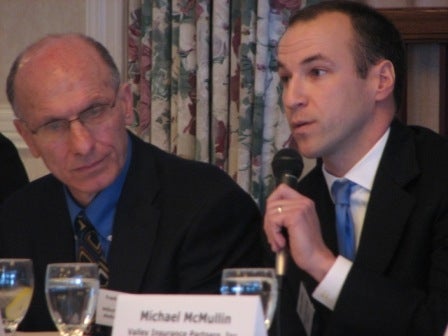Massachusetts’ health care has made sure that nearly all of the state’s residents have health insurance, but it has left small businesses wondering how to deal with the system’s swelling cost. Small business owners, politicians and health care industry executives shared ideas for how to control the cost of health care this morning at a panel discussion put on by the Blackstone Valley Chamber of Commerce at the Pleasant Valley Country Club.
Pre-written questions from chamber members ranged in tone from curiosity to concern and asked in general how small businesses can expect to survive if health care remains so expensive.
Bill Fredericks, president and CEO of Allcare Home Medical Supply Corp. of Millbury, said, “It’s a tough pill to swallow when you’re talking to an employee who’s 20 years old and $5 an hour is going to health insurance. When I was 20, I would’ve rather had the $5 an hour. I hate to see employees making less money every year. It seems like we’re always taking a step back.”
Michael McMullin, president of Valley Insurance Partners in Whitinsville, said employers can seek out different types of plans, like high deductible plans, to try to allay direct insurance costs.
State Sen. Richard T. Moore, D-Uxbridge, said he’s a bit concerned about the widespread use of high-deductible plans. “You realize a cost savings by going to a high deductible plan, but it is a concern because, you’ve got a deductible of $2,000 and you need an MRI, and it’s $1,700.”
And while health savings accounts and other options exist for putting money aside for such situations, Moore noted that “most people will take the savings and figure, ‘I’ll take a chance.'”
Employers have options, too, said Katie McEvoy-Zdonczyk of Worcester-based Fallon Community Health Plan.
She said for many, offering a plan with a limited network of physicians rather than a broad network could be more efficient and cheaper.
“The dots don’t seem to connect in this world of health care. If people realized that a broader network equals $5 less per hour, maybe they would see a limited network in a different way,” McEvoy-Zdonczyk said.
“You have to talk to employees about what they want rather than guessing at what they need. You have to figure out what makes sense for your business,” said Andrew Salmon of Salmon Family Health Services.
Other panelists included Frank Saba, president and CEO of Milford Regional Medical Center, Michael McMullin of Valley Insurance Partners, Elaine Kamyck-Racine of Senior Comfort Services and State Sen. Michael Moore, D-Millbury. It was moderated by Todd Gleason, partner at the law firm of Hinckley, Allen & Snyder LLP, which has offices in Boston, Andover, Concord and Hartford, Conn.

